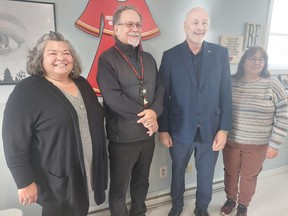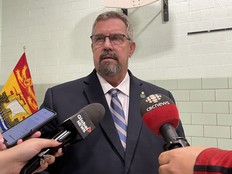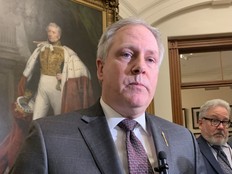Province funds Mi'kmaq centre with huge waitlist for mental health services
But First Nation chief admits there are disagreements in his community over addictions, drug use and mental wellness

Article content
Five First Nations with long waitlists for mental wellness programs will see nearly half a million dollars flow from the province to a special centre dedicated to serving Indigenous people.
The Higgs Progressive Conservative government announced on Monday it would put $480,000 into the expansion project at the Natoaganeg (Eel Ground First Nation) Community Development Centre.
The small blue building on the main drag of the First Nation beside Miramichi looks like a modest house from the outside, but inside it has several crammed offices. The provincial funds will allow it to double in size, with a groundbreaking in the spring and a completion date later in the year.
“We have a 1,000 people in our database, so this extra space will be incredible,” said Shelley Francis, a nurse from Tobique First Nation with 30 years’ experience who leads the Mawlugutineg mental wellness team at the centre.
“We’re going to expand into the back of the lot, where there’s a forest. It’s important, our connection to the land. People will be able to see nature and trees around them and it will be really good for their mental health. It will connect people to their culture and traditions.”
The mental wellness team serves five Mi’kmaq communities: Natoaganeg, Metepenagiag, Esgenôpetitj, Oinpegitjoig and Ugpi’ganjig.
Do you know how much it costs for someone from this community to take a taxi to get services in the city?
Cheryl Ward
The hope is to connect the centre with pathways to a neighbouring women’s shelter, which just opened in November, and the nearby health centre.
The facility also provides job training to people in Natoaganeg.
Cheryl Ward, the director, said the expansion would provide badly needed training space in the trades and mental health fields.
“Even having a Service Canada office in here to provide social insurance numbers, which are a barrier to our youth, or having driver’s training so that our members can get a driver’s licence and help them get a job,” she said.
The community has a high unemployment rate, something Ward wants to change.
“We don’t have buses coming out here,” she said. “Do you know how much it costs for someone from this community to take a taxi to get services in the city? Twenty-five dollars, one-way. And if you forget a document when you go to Service Canada to get a social insurance number, it can end up being a $100 trip for someone who doesn’t have the means.”
Chief George Ginnish welcomed the injection of provincial funds, even if First Nations leaders haven’t had a rosy relationship with the Higgs Tory government.
He acknowledged some of the tension in the community over the use and abuse of recreational drugs, which has had a devastating impact on Indigenous people already suffering from inter-generational trauma.
Near the entrance of the community is a large sign posted by the First Nation. It states: “Drugs are not our culture. Take action to protect our community.”

But not long after are several signs promoting cannabis and recreational drug sales.
“You have different perspectives on what’s acceptable for mental wellness and the treatment of stress and trauma,” Ginnish told Brunswick News. “It’s no secret that Health Canada supplies cannabis for veterans to those suffering from PTSD. I have kids asking me, ‘Why is the sign still there if you can get them so easily?’ Well, I tell them drugs are not our culture. It’s not. There may be an opportunity for drugs with proven clinical value to help people, but you do not self-medicate. You don’t get to say, ‘I’m going to buy whatever I want, that’s my wellness plan.’ It’s not.”
He also criticized Ottawa for rolling out the legalization of cannabis in 2018 without adequate consultation with First Nations people.

The money for the latest project is not a substitute for the tax agreements the Higgs government cancelled, angering the chiefs. Those agreements, some going back 40 years, allowed First Nations to recoup the provincial portion of sales taxes from businesses within their community to spend on services, such as social housing.
Natoaganeg did not benefit from the old tax agreements as much as some First Nations did closer to major highways. But it had big plans to cash in on the agreement. Ginnish said within the next year and a half, Natoaganeg wants to sign a deal with the federal government for 1,000 acres of reserve land somewhere in the province, to make up for land that was stolen from the community by settlers.
By that time, he hopes the next provincial government, regardless of the party in power, will renew some sort of tax agreement.
“Our housing needs are dire,” he said.
There’s been a big step forward between First Nations and the provincial government creating new agreements.
Réjean Savoie
The Tory government has already cut deals with three other First Nations that saw their tax agreements cancelled. Neqotkuk (Tobique First Nation) was the biggest recipient, signing a five-year, $22-million development agreement last June.
“It’s always important to make a better relationship with our First Nations,” said Réjean Savoie, the minister responsible for the Regional Development Corporation, who made Monday’s announcement. “There’s been a big step forward between First Nations and the provincial government creating new agreements. A few of them have signed agreements already, and negotiations are ongoing to move this forward and get more communities involved.”












Postmedia is committed to maintaining a lively but civil forum for discussion. Please keep comments relevant and respectful. Comments may take up to an hour to appear on the site. You will receive an email if there is a reply to your comment, an update to a thread you follow or if a user you follow comments. Visit our Community Guidelines for more information.